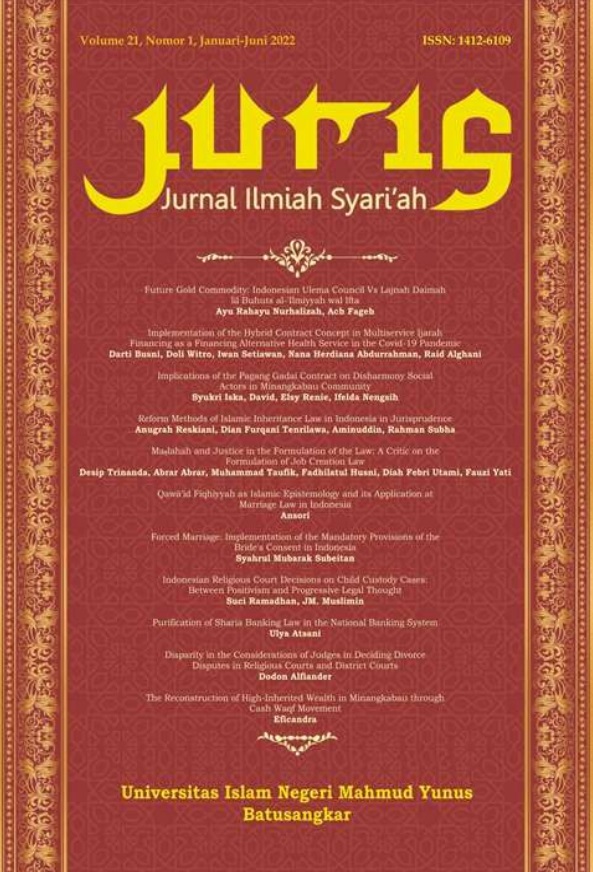Polygamy among Muallaf in Manado: Islamic Legal Perspectives and Social Challenges
DOI:
https://doi.org/10.31958/juris.v23i2.12307Keywords:
Polygamy, Muallaf, Religion, Islamic LawAbstract
The practice of polygamy is often a controversial topic and raises questions about religious and cultural identity. Although Islamic law permits polygamy under certain conditions, how this is understood and applied by the convert community in a Christian setting is complex. This study explores the dynamics of polygamy among converts (Muallaf) in the multicultural environment of Manado, Indonesia, from the perspective of Islam and society. Using an empirical normative approach, the study involved 35 informants, consisting of 25 Muallaf who were married in Islam and ten who were engaged in polygamous marriages. Data was collected through in-depth interviews, and the analysis identified common patterns and significant findings, focusing on factors influencing attitudes towards polygamy. The results revealed differences in views among Muallaf regarding polygamy; some accept this practice as part of Islamic teachings, while others reject it as contrary to their previous values. Factors such as religious interpretation, pre-conversion values, and legal and social barriers affected their attitudes toward polygamy. The problematic legal hurdles of obtaining polygamy permits in court highlight additional challenges in implementing this practice in Manado. Nevertheless, polygamy remains a controversial issue in this predominantly Christian society, reflecting the complexity of the interaction between religion and culture. This research provides important insights into how polygamy is perceived and practiced in multicultural environments and the challenges Muallaf faces in understanding and applying Islamic law in their social contexts.
References
Andika Persada Putra,Bank Agency in the Perspective of the Common Law System, Legal Perspective, Vol. 16 No. November 2, 2016
Bambang Lesmono, Saparuddin Siregar,Literature Study About Agency Theory, Economics, Finance, Investment and Sharia (EQUITY) Vol 3, No 2, November 2021
Bambang Sunggono, 2012Legal Research Methodology, PT. Grafindo King
Persada, Jakarta
Darji Darmodihardjo in Hyronimus Rhiti, 2011,Philosophy of law ; Complete edition (From Postmodernism), Classics to, Atma Jaya University, Yogyakarta
H Dadang Husen Sobana, 2016,Introduction to Banking Law in Indonesia, CV.
Faithful Library, Bandung
Indirani Wauran, Wicaksono,Bancassurance Activities in the Banking world: Are there any bundling practices that violate business competition laws?, Legal Reflections, Vol 9. No. 1, 2015
Isaac, 2017,Legal Research Methods and Thesis Writing, Thesis and
Dissertation, Print I, Alfabeta, Bandung
Jeremy Bentam, 2019Statutory Theory: Principles of Legislation, Civil Law and Criminal Law, Nuance Scholar, Bandung
Mulhadi, 2017,Fundamentals of Insurance Law, Raja Grafindo Persada, Depok
Abdulkadir Muhammad, 2006,Indonesian Insurance Law, PT. Image Aditya Bakti, Bandung
Nurul Badriyah, The Role of Banking Intermediation Against Micro and Small Enterprises
Intermediate (Umkm), Journal of Development Economics, Vol. 7, No. 2, 2009
Financial Services Authority of the Republic of Indonesia, Financial Services Authority Regulation Number 23 /Pojk.05/2015 Concerning Insurance Products and Marketing Insurance Products. State Gazette of the Republic of Indonesia of 2015 Number 287. Article 1 point 13
Article 1313 of the Civil Code
Petter Mahmud Marzuki, 2012,Introduction to Law, Prenada Media Group, Jakarta
R. Tony Prayogo, "Application of the Principle of Legal Certainty in Regulations Supreme Court Number 1 of 2011 Regarding the Right to Judicial Review and In the Procedural Guidelines for Examining the Act ( the Implementation of Legal Certainty Principle in Supreme Court Regulations"Number 1 of 20, Journal of Indonesian Legislation, Vol. 13, No. 2, 2016
Rachmadi Usman, 2001,Legal Aspects of Banking in Indonesia, Gramedia Main Center, Jakarta
Ridwan, Khairandy, 2013 Principles of Indonesian Commercial Law (First Printing), FH UII Press, YogyakartA
Sri Mamudji Soerjono Soekanto, 2011,Normative Legal Research, PT. King Grafindo Persada, Jakarta
Sukarno Aburaera,et, all,2016,Prenada Media Group, Jakarta Law Number 40 of 2014 Concerning Insurance
Law of the Republic of Indonesia Number 7 of 1992 as has been amended by Law Number 10 of 1998 concerning Banking. State Gazette of the Republic of Indonesia of 1998 Number 182. Supplement to the State Gazette of the Republic of Indonesia Number 3790.
Hereinafter referred to as the Banking Law
Yuhelson, 2018,Sharia Banking Law, Zahir Publishing. Yogyakarta1Nancy
S. Haliwela,“Recording of Telephone Conversations as Evidence Bank Agreement with Customer on Bancassurance”, Law Journal Civil Procedure, Vol. 1, No. 2, July – December 2015
Downloads
Published
How to Cite
Issue
Section
License
Copyright (c) 2024 Suprijati Sarib, Eti Yusnita, Cholidah Utama, Muhammad Irfanul Hakim Zain

This work is licensed under a Creative Commons Attribution-NonCommercial-NoDerivatives 4.0 International License.
Authors who publish with this journal agree to the following terms:- Authors retain copyright and grant the journal right of first publication with the work simultaneously licensed under a Creative Commons Attribution License that allows others to share the work with an acknowledgement of the work's authorship and initial publication in this journal.
- Authors are able to enter into separate, additional contractual arrangements for the non-exclusive distribution of the journal's published version of the work (e.g., post it to an institutional repository or publish it in a book), with an acknowledgement of its initial publication in this journal.
- Authors are permitted and encouraged to post their work online (e.g., in institutional repositories or on their website) prior to and during the submission process, as it can lead to productive exchanges, as well as earlier and greater citation of published work (See The Effect of Open Access).








